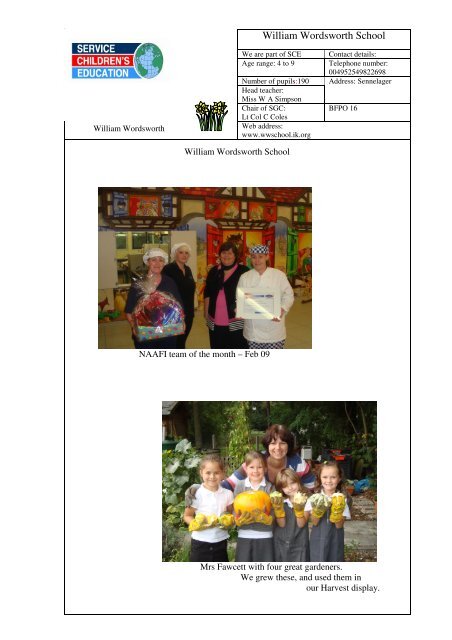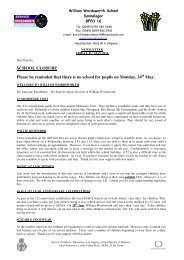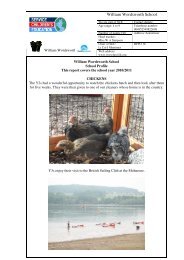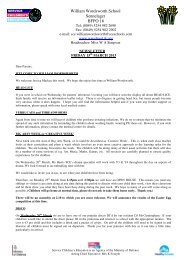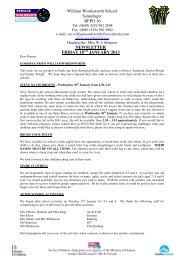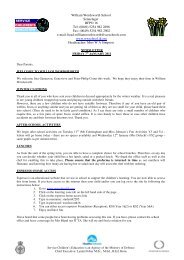William Wordsworth School - Ik.org
William Wordsworth School - Ik.org
William Wordsworth School - Ik.org
- No tags were found...
Create successful ePaper yourself
Turn your PDF publications into a flip-book with our unique Google optimized e-Paper software.
How do we make sure our pupils are healthy, safe and well-supported?<br />
We have an induction programme for pupils, which include a ‘passport’ that the children are assisted through<br />
so that they become familiar with the school environment and activities. Our ‘leaving’ booklet involves<br />
finding out about where they are going and a little about their new school. Mrs Winks supports our Y1-4<br />
pupils with this at present.<br />
The inspectors in our recent OFSTED report in June 2009 said that, ‘The care, guidance and support for pupils<br />
is good. They feel safe from bullying and they are confident that they will receive help from an adult if they<br />
have any concerns. The school’s support for pupils while their parents are deployed is valued highly by leaders<br />
in the garrison. Pupils make a good contribution to life in their school through membership of the <strong>School</strong><br />
Council and through a wide range of additional responsibilities such as befriending newcomers.’<br />
We make sure that the children are healthy by:<br />
Providing a healthy lunch in our school dining room. Our menus are well balanced and include a Salad<br />
bar so that children can make healthy choices. Bread, water and napkins are available on the tables.<br />
Our kitchen staff, who work very hard each day to prepare well balanced and delicious food for us, won<br />
Naafi Team of the Month in February 2009.<br />
Encouraging parents to send in healthy packed lunches and in liaison with NAAFI have introduced ‘Fruity<br />
Friday’ for all pupils. This was after a request by the school council.<br />
We have available a piece of fruit or a vegetable for morning break for all pupils.<br />
In PSHE and Science the children are taught throughout the year about being healthy.<br />
Ensuring every child has PE four times a week and every day in FS2.<br />
Swimming is part of the curriculum for all Y2-4s.<br />
We make sure that children feel safe by:<br />
Following the school’s ‘Golden Rules’<br />
Making sure that they know who to approach if they have a problem.<br />
Making sure that they know bullying is taken seriously and is always investigated.<br />
Teaching them about different behaviours and what is considered acceptable and what to do about<br />
unacceptable behaviour.<br />
Following Health and safety procedures within school and on school outings.<br />
How do we make sure all pupils attend their lessons and behave well?<br />
The behaviour in school is very good. All the staff set high expectations of themselves and the children. The children<br />
follow the ‘Golden Rules’ and each Key Stage have classroom rules, which are negotiated with the children at the start of<br />
the year.<br />
In our recent OFSTED report (June 2009) it was reported as, ‘Pupils’ behaviour is good and this contributes to their<br />
enjoyment of school.’<br />
We are aware that the number of absences are higher than they should be and are working hard to reduce them by:<br />
Informing parents when they register their children of the expectations regarding absences.<br />
Following the procedures in place when a child is absent.<br />
Regular termly reminders about the procedures for requesting ‘leave of absence’.<br />
Regular monitoring of absence patterns and the Head teacher talking to parents on the impact of absence on their<br />
child’s learning<br />
The Garrison has been proactive in producing guidance regarding attendance<br />
How do we support pupils to settle into school quickly?<br />
What links do we have with other schools to assist a smooth transfer?<br />
New children arriving in school settle quickly. They are given a tour of the school, meet their new teacher and are assigned<br />
a ‘buddy’. The buddy shows them where the pegs, lunch boxes, toilets and many other features can be found. They also fill<br />
in a passport over the first few weeks, which show a number of places around the school that they have to find as well as<br />
questions they have to feel confident in answering.<br />
The school council initiated, ‘The Friendship Zone’ in the playground where new or pupils who are feeling lonely can find<br />
a friend.<br />
On arrival the documentation from the previous school is read by the class teacher. Assessments are carried out so that<br />
their needs are met immediately and progress can be maintained. The headteacher also monitors all new arrivals and<br />
ensures that the office contacts previous schools when there has been a lack of information. Any available data is added to<br />
our tracking system, and contact made with parents if there are concerns.<br />
On departure children leave with a portfolio of work as well as a report, up to date assessments and targets so that their<br />
new school has as much information as possible to ease transition.<br />
With support from Mrs Winks one of our ITTAs, the pupils in Y1-4 complete a ‘leaving pack’. They are taken through a<br />
short booklet where they are able to find out about where they are going and a little about their new school. We hope this<br />
will ease the transition process for our children.
How are we working with parents and the community?<br />
We have an ‘Open Door’ policy and encourage parents and friends to become involved in the life of the<br />
school by:<br />
Having an ‘Open House’ every Wednesday between 2.45 and 3.15 when parents can come in and speak<br />
with their child’s teacher or any other member of staff without an appointment.<br />
Inviting each year group on a monthly rota to ‘Parents to Lunch’.<br />
Inviting parents to attend parents’ afternoons / evenings, sports events as well as other school activities.<br />
It is important for our parents to receive information about the school and about their children’s progress. We<br />
do this by:<br />
Our homework diary, which can involve daily communication between parent and teacher.<br />
Newsletters every Friday.<br />
Termly curriculum overviews and timetables for each class<br />
A termly information booklet, which gives information on homework, behaviour and other specific<br />
policies and expectations.<br />
Having a parents’ afternoon / evening every term where the children’s progress is discussed.<br />
Providing an annual report at the end of the summer term.<br />
We have developed a good working relationship with our local community, military and other services within<br />
the Garrison who provide us with expertise, advice and support when needed. This has included:<br />
Giving us the opportunity to visit their workplace e.g. the Fire Station, Post Office, Church<br />
Weekly visit by Padre<br />
German ‘swimming’ venue<br />
We continue to develop the link with our German school in Sande. Our Y4s have regular meetings with their<br />
German friends.<br />
We are fortunate to be well supported by specialists who help us help our children including:<br />
An Educational Psychologist<br />
A Speech and Language Therapist<br />
A Health Visitor<br />
A specialist German teacher who comes in every week.<br />
We are also developing closer links with AWS and Home Start through multi agency working.<br />
What activities are available to pupils?<br />
The development of the whole child is important to us and ‘Every Child Matters’. We do this by:<br />
Providing a range of sporting activities within the PE curriculum as well as through clubs. In PE we<br />
cover dance, gymnastics, games, outdoor activities and swimming. In clubs we have gymnastics, dance<br />
and outdoor games throughout the year.<br />
Other clubs include ICT, choir, knitting, cartoons, cross stitch and art & craft.<br />
Having an enrichment hour for years three and four every Tuesday afternoon where a variety of<br />
music, ICT and dance are experienced by all pupils.<br />
Developing a creative approach to learning by having an annual ‘Big Arts Week’ where each year group<br />
spends a week working creatively on a theme.<br />
Involving all pupils in the Christmas productions.<br />
Inviting a variety of people into school to share their expertise including the Padre, ‘Birdwise’, musical<br />
groups.<br />
<br />
Our continuing success this year has been the development of the pond and garden areas, with the children<br />
taking a keen involvement in all activities. The sight of the blocks of ice cut from the pond during the<br />
winter was an amazing experience for all.<br />
We also visit a variety of different environments within the German community, as well as our annual<br />
residential week to the Mohnesee now added to with by our skiing week in January. These support children’s<br />
learning through real life experiences and include visits to:<br />
o<br />
o<br />
o<br />
o<br />
o<br />
o<br />
o<br />
Hovelhof – a German folk museum<br />
Christingle Service in The Abdinghof<br />
Paderborn Christmas Market<br />
Local buildings and services in Sennelager<br />
Paderborn sites – Geographical and Historical<br />
A train journey<br />
Garrison facilities; post office, churches, fire brigade etc
What have pupils told us about the school, and what have we done as a result?<br />
All the staff in the school considers the pupil’s voice to be important. We listen to children’s views by:<br />
Having Class and <strong>School</strong> Councils<br />
Annual Pupil survey – in 2009 we did not hold one as OFSTED had a questionnaire they asked the pupils<br />
to fill in<br />
Allowing the children the opportunity to talk to adults as and when necessary<br />
Circle Time opportunities in all classes<br />
The children have told us the following and we have made changes accordingly:<br />
<strong>School</strong> Council:<br />
More up to date atlases<br />
Separate session for girls’ football<br />
Bibs for football<br />
More packed lunch and school dinners to sit together – two tables in middle and one at back<br />
½ termly class visits<br />
Herbs in garden<br />
How much progress do pupils make between age 4 and 9?<br />
This is difficult to measure in our school because of the mobility rate. However, this does not stop us from<br />
always trying to ensure that each child makes the maximum progress possible. We have a comprehensive<br />
tracking system that measures children’s progress every term, and this enables us to keep a careful eye on how<br />
everyone is doing.<br />
June 2009 OFSTED report excerpts.<br />
‘Pupils start the school with skills and knowledge that are broadly typical for their age group. In the Early<br />
Years Foundation Stage class and in some classes in Key Stages 1 and 2, the majority of pupils make better<br />
than expected progress in reading, writing and mathematics, however, such good progress in all subjects is not<br />
found in every class. As a result the proportion of pupils achieving standards in line with the expectations for<br />
their age is no higher than average.’ and ‘In some classes teaching is good because the pupils are enthused by<br />
interesting work which has been carefully planned to provide the correct level of challenge for all groups.’<br />
We are determined to ensure that all classes make better than expected progress and all children have access to<br />
good teaching.<br />
How have our results changed over time?<br />
We aim to improve on standards year by year. This is difficult to measure in our school because the mobility<br />
rate is very high and the children that are here at one point in the year are not the children here later on.<br />
However, this does not stop us from always trying to raise our standards.<br />
End of Key Stage 1 (Y2) Assessment Results (% of pupils gaining Level 2 or above)<br />
09TA 08TA 07 TA 06 TA 05 TA<br />
SATsNational SATs SATs SATs<br />
Reading 76 (84)(84) 93 (90) 100 (100) 80 (80) 68<br />
Writing 72 (80)(81) 84 (65) 90 ( 93) 82 (75) 71<br />
Maths 84 (88)(89) 94 (94) 97 (100) 78 (84) 79<br />
End of Year 3 Assessment Results (% of pupils gaining Level 3 or above)<br />
09TA 08TA 07 TA 06 TA 05 TA<br />
SATs SATs SATs SATs<br />
Reading 55 (53) 53 (45) 58 (45) 52 (58) 51<br />
Writing 36 (45) 20 (17) 39 (39) 29 (39) 42<br />
Maths 48 (41) 43 (45) 47 (42) 23 (36) 55<br />
End of Year 4 Assessment Results (% of pupils gaining Level 3B or above)<br />
09TA 08TA 07 TA 06 TA 05 TA<br />
SATs SATs SATs SATs<br />
Reading 72(69) 56 (48) 57 (61) 66 (68) 66<br />
Writing 41(61) 41 (30) 54 (36) 38 (32) 18<br />
Maths 55(59) 48 (44) 54 (54) 59 (39) 54<br />
We have developed our own value added system that monitors how individual children achieve over time.<br />
The average child in year 1 and 2 would rise about one level; e.g. 1a (08) --- 2a (09). In year 3 and 4 about<br />
one and a half sub levels in a year; e.g. 2b (08) --- 2a / 3c (09)
Ofsted’s view of our school<br />
Overall effectiveness of the school:<br />
Our last inspection was in June 2009. We were one of four pilot schools from within the authority that was inspected under<br />
the new regulations, and it was quite clear to all that, ‘The bar had been raised.’ Here are excerpts from the report. If you<br />
wish to read it in full, it is available from the office, or can be read on our website.<br />
‘This school provides a satisfactory quality of education. Within this, the curriculum and the care, guidance and support for<br />
pupils are good. Pupils start the school with skills and knowledge that are broadly typical for their age group. In the Early<br />
Years Foundation Stage classes and in some classes in Key Stages 1 and 2, the majority of pupils make better than<br />
expected progress in reading, writing and mathematics.’<br />
‘In some classes teaching is good because the pupils are enthused by interesting work which has been carefully planned to<br />
provide the correct level of challenge for all groups.’ ‘Where teaching is most effective, lessons have a clear focus and the<br />
work is interesting, for example when it is linked to fieldwork in the locality or visits to places of interest. Teachers<br />
skilfully check pupils’ learning during and after lessons and adjust their planning if they judge that more reinforcement or<br />
challenge is needed.’<br />
‘Senior leaders have a clear understanding of the priorities for improvement and well focused plans for implementing<br />
them.’<br />
‘Subjects are linked together within interesting topics and this helps pupils to extend their literacy, numeracy and<br />
information and communication technology skills. A good example is when pupils gather data on the different uses of land<br />
in the locality in order to prepare a graph. Pupils are given good opportunities to develop their skills of practical enquiry,<br />
particularly in science.’<br />
‘The headteacher and deputy work effectively together and they are increasing the capacity of the school by helping other<br />
teachers to develop senior and middle leadership roles.’<br />
‘The Early Years Foundation Stage is well led. Staff work together very effectively and teaching assistants are clear about<br />
their roles. Staff continuously modify their approaches when they identify strengths and areas for improvement in<br />
children’s progress. Parents are very well-informed about how they can be partners in their children’s education.’<br />
Explanation of Ofsted grades:<br />
Key for inspection grades<br />
Grade 1<br />
Grade 2<br />
Grade 3<br />
Grade 4<br />
Outstanding<br />
Good<br />
Satisfactory<br />
Inadequate<br />
These are the grades for pupils' outcomes:<br />
Pupils' attainment 3<br />
The quality of pupils' learning and their progress 3<br />
The quality of learning for pupils with learning difficulties and/or disabilities and their progress 3<br />
How well do pupils achieve and enjoy their learning? 3<br />
To what extent do pupils feel safe? 2<br />
How well do pupils behave? 2<br />
To what extent do pupils adopt healthy lifestyles? 2<br />
To what extent do pupils contribute to the school and wider community? 3<br />
Pupils' attendance1 3<br />
How well do pupils develop workplace and other skills that will contribute to their future economic<br />
well-being? 3<br />
What is the extent of pupils' spiritual, moral, social and cultural development? 2<br />
These are the grades for the quality of provision:<br />
The quality of teaching 3<br />
The use of assessment to support learning 3<br />
The extent to which the curriculum meets pupils’ needs, including, where relevant, through partnerships 2<br />
The effectiveness of care, guidance and support 2<br />
These are the grades for leadership and management:<br />
The effectiveness of leadership and management in communicating ambition and driving improvement 3<br />
The effectiveness with which the school promotes equality of opportunity and tackles discrimination 2<br />
The effectiveness of safeguarding procedures 2<br />
The effectiveness of the governing body in challenging and supporting the school so that weaknesses are<br />
tackled decisively and statutory responsibilities met 3<br />
The effectiveness of the school's engagement with parents and carers 2<br />
The effectiveness of partnerships in promoting learning and well-being 2<br />
The effectiveness with which the school promotes community cohesion 3<br />
Early Years Provision:<br />
Outcomes for children in the Early Years Foundation Stage 2<br />
The quality of provision in the Early Years Foundation Stage 2<br />
The effectiveness of leadership and management in the Early Years Foundation Stage 2<br />
Overall effectiveness of the Early Years Foundation Stage 2
What have we done in response to Ofsted?<br />
OFSTED – What the school should do to improve further:<br />
Improve pupils’ learning and progress by increasing consistency in the quality of teaching and use of<br />
assessment. The school should concentrate on the following areas:<br />
Improve assessment for learning by;<br />
ensuring lessons have focussed success criteria<br />
using targeted questions to assess the progress of all groups of pupils in lessons<br />
giving pupils feedback during lessons that helps them to accelerate their progress<br />
using the final part of the lesson to assess how far pupils have met the success criteria and to<br />
identify what needs to be planned for the next lesson<br />
ensuring marking relates to success criteria and informs pupils about how they can improve their<br />
work.<br />
Ensure that all staff implement agreed school policies consistently<br />
More information<br />
If you would like more information about school, please contact us and we will try to provide anything that<br />
would support you and your child with their learning.<br />
By e-mail: head.williamwordsworth@sceschools.com<br />
By telephone: 05254 982 2698<br />
Our website: www.wwschool.ik.<strong>org</strong><br />
This Profile was last updated in October 2009


